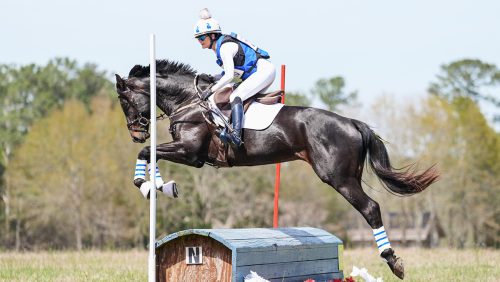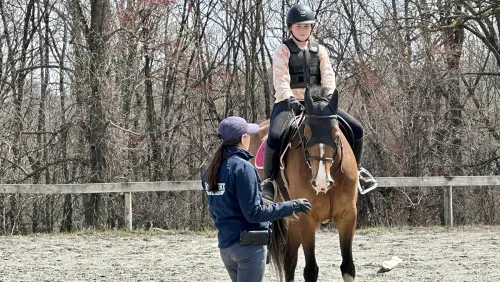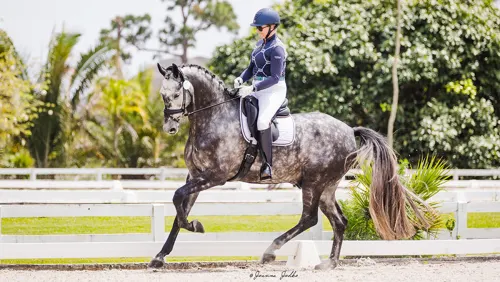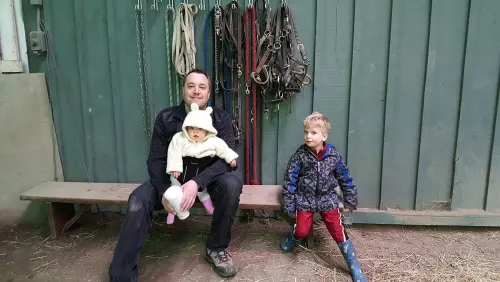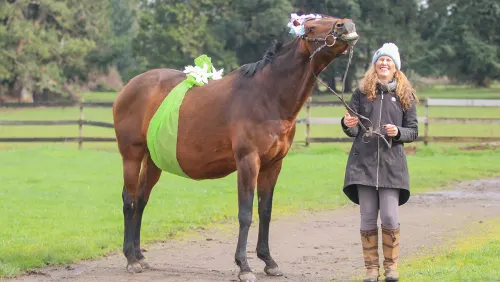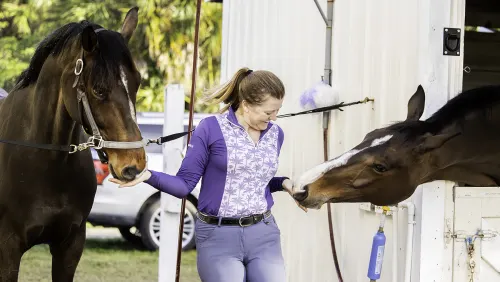After a long and mostly patient search to find a new horse, an accident in January meant I had to wait even longer to ride him.
Right before New Year’s, my sweet, geriatric horse, LJ, decided he didn’t want me to lead him around while he grazed. He took off and, in his exuberant departure, kicked me in the head. An ambulance ride and surgery later, I gained some titanium in my face, a mild concussion and a painful, horseless recovery. I got back on the horse a month later, and I’m regaining my confidence by the day.
This was a scary injury, but I nonetheless had to laugh when acquaintances asked if I was done with riding. (If they were good friends, they would know me better than to think that!) Rather, I consider myself lucky to have made it through 26 years of riding without a hospitalization.
Because so many riders are bound to get injured at some point, I thought I would share what I learned in the hopes it helps others get through—or avoid—accidents of their own.
1. Community is so important. These past months have made me treasure my family and friends more and resolve to be there for them more, too. My family, barn family and friends from so many corners of my life completely spoiled me with blankets, flowers, food, gift cards to replace the clothes that were cut off in the ambulance, and messages of love and support. One friend even connected me with a Dover Saddlery employee who replaced my winter coat for me for free.
This support made my injury so much easier to swallow. While the universe handed me a kick in the face, it also served up a reminder of how many good people there are in the world—and how lucky I am to be friends with so many of them.
ADVERTISEMENT
2. You are allowed to have baggage. Those are the exact words my friend Stacey told me when I told her that, nope, I would not be hand-walking my new 5-year-old OTTB, The Quantico Kid, the half mile to the ring to longe him before my first ride back. I would rather ride and take the risk of falling than hand-walk. Hand-grazing is also off the “retirement activities” list for LJ for the foreseeable future.
I may never be as comfortable as I used to be hand-walking, and that’s OK. I will get braver—I already am braver— but there’s no point in pushing myself. The horses will know if I am scared.
This experience has also made me more understanding of other people’s “baggage.” I luckily avoided major injuries for so long that fear has never been a big part of my riding life. I have probably been a bit cavalier about other people’s fear and anxiety. No longer—I get it!
3. Being with horses is healing. I was scared about seeing my horse again—right up until the moment I saw him. The first time I went, about a week after the accident, I was still quite fragile, both physically and emotionally. The plan was for my husband to get the horses while I stayed on the other side of the fence. But as I stood outside LJ’s field, chatting with my trainer, LJ walked right up to me. His soft nuzzle in my back reminded me he had no idea how badly he hurt me. We were still buds.
My first ride back, a month after the accident, was an even bigger confidence builder. I was the first to get on Kid—after our unplanned month off—and it was his first time in the indoor, too. He was mostly calm, but had one explosive freak-out, and I almost fell off. As I pulled myself back into the saddle, I thought, I’ve still got it.
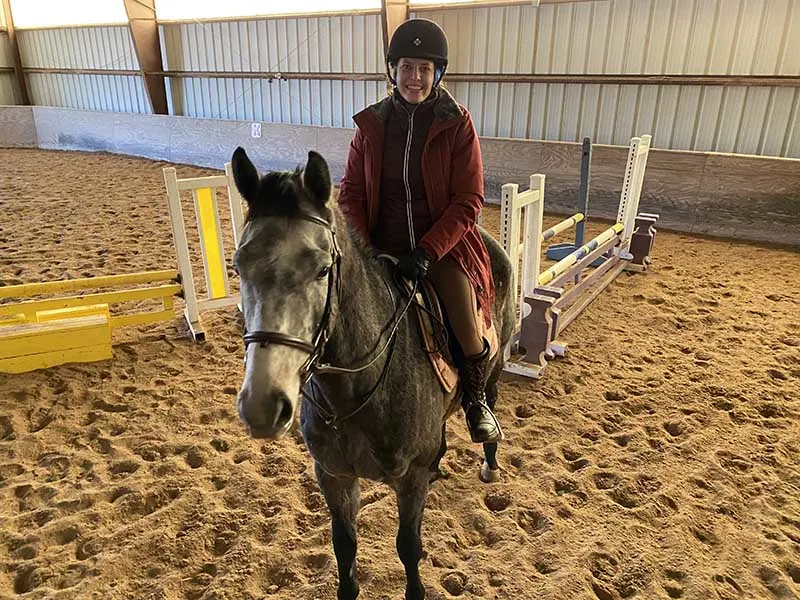
Author Tracy Gold during her first post-accident ride on her new horse, The Quantico Kid. Photo Courtesy Of Tracy Gold
While it would have been nice for him to be foot perfect, I was glad to have a reminder that I could still sit a spin, bolt and hop. I was indeed ready to be back on the horse. Now, Kid and I are working toward the Retired Racehorse Project’s 2022 Thoroughbred Makeover, and building our confidence back together.
ADVERTISEMENT
4. Wear a helmet for groundwork. I was surprised that it was LJ, not Kid, who put me in the hospital. I always wear a helmet when I’m on the ground with Kid, even just to groom. But I neglected to wear one with good old LJ. Oops. I don’t know that a helmet would have helped this specific injury, but if the kick had been a few inches higher, it would have saved my skull.
5. Don’t neglect ground manners with your quiet horses. I am not the strictest with LJ’s ground manners. Oops again. LJ is normally chill. If he steps on the lead rope, he just calmly moves his hoof. He is gentle with my toddler, and he doesn’t care if a tractor rolls by clattering. But he will occasionally push past me to get out of his stall, or spin in circles while I hose him off. I am now working on more strongly establishing myself as the leader on the ground with any horse I handle.
6. Beware of long lead ropes. When I got hurt, I was using a 14-foot lead and knotted rope halter that I use for round pen work. My theory about why LJ kicked me is that he took off toward his friends in the field, and by the time I yanked on the lead, he was far enough away that I was in range of his hind feet. If I’d been using my normal lead rope, I might have gotten his head around to me faster, or just dropped the lead. I’ve gone back to using a shorter lead rope and chain instead of the rope halter.
7. Ask someone to bring your favorite lip balm to the hospital. This seems silly, but it might have saved me a lot of irritation. Between fasting and having my mouth pulled open for surgery, my lips got horribly chapped. The hospital’s lip balm only made it worse. Two months later, my lips are still healing. Ouch. I wish I’d had my trusty Aquaphor in the hospital with me. Whether it is lip balm or some equivalent that will help you be more comfortable (a special pillow, lotion, whatever) ask for someone to bring it!
8. There are medications to help you. Like sedatives. If you are freaking out (and it’s OK to be freaking out), there are chemicals to help with that. I highly recommend chemically drifting on a happy cloud when you’re told scary news like multiple bones in your face are broken. It makes everything easier! If you have a weak stomach, I’d also recommend asking for anti-nausea meds for coming out of anesthesia. I even got some prescription medications that helped my chapped lips a couple weeks after surgery.
Don’t try to tough out anxiety, nausea, shaking or any weird symptom. Tell your medical team; they can most likely help.
I hope you never have to use most of this advice. If you have other wisdom to share about getting over an accident, I would love to hear about it in the comments.






